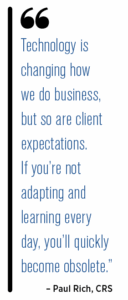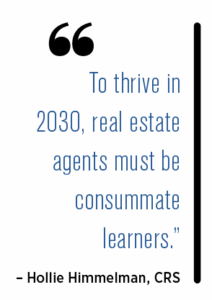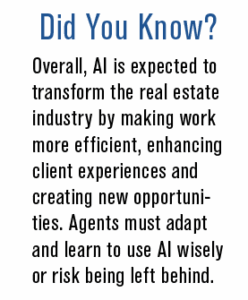By Rachel Arterberry
“Learning, learning, learning—that’s what keeps you in this business,” says Steven Rath, CRS, broker-owner of Rath Real Estate in Roseville, California.
In the real estate industry, where change is constant, one truth stands firm: Lifelong learning is essential. Looking ahead to 2030, successful agents will be those who keep evolving, honing both technical and human skills to stay ahead of shifting markets and rising client expectations.
Over recent decades, the industry has transformed dramatically. Technology has revolutionized how agents communicate, market properties and analyze data, while consumers have grown more informed and demanding. Seasoned professionals agree: Agents who stop learning risk being left behind.
Paul Rich, CRS, from The Brokerage, A Real Estate Firm in Henderson, Nevada, shares, “Technology is changing how we do business, but so are client expectations. If you’re not adapting and learning every day, you’ll quickly become obsolete.”
However, lifelong learning extends beyond acquiring new tools; it’s a mindset rooted in curiosity, adaptability and ethical service. For experienced professionals like Alexis Bolin, CRS, an associate broker at Keller Williams in Pensacola, Florida, with 47 years of experience in the industry backing her, staying committed to learning is about integrity as much as it is about survival. “If you’re not learning, you’re leaving the business and just don’t know it yet.” It ensures agents continue to offer true value, well beyond what clients can find online.
What Agents Need to Learn to Be Competitive in 2030
To remain competitive, today’s agents must strike a balance between embracing technology and mastering essential human skills. The future belongs to professionals who can skillfully combine both worlds.
Key areas agents should prioritize include:
- Artificial Intelligence and Automation
AI can enhance marketing, streamline client communication, provide sharper market insights and boost daily efficiency. However, agents must remember that AI is a tool, not a substitute for human judgment, ethics or empathy.
Rath compares the impact of AI to the arrival of the internet. “AI is going to start taking a big bite out of those agents who don’t apply it well.” - Advanced Communication Skills
Effective negotiation, active listening and in-person engagement remain critical. These abilities build trust and help agents navigate even the most complex transactions with confidence.
Bolin shares that professional development should focus not just on transactions but also on ethics, communication and true client advocacy. “Learning isn’t optional. It’s the fuel that drives relevance and resilience.” - Exploring Specialized Niches
Learning about emerging segments, such as sustainable and wellness-focused housing, LEED-certified homes or aging-in-place solutions, can help agents stand out.
Specialized training and designations offer opportunities to create unique value propositions in evolving markets.
“Sustainability and wellness-focused living will play an even bigger role in buyers’ decisions in the years ahead,” Hollie Himmelman, CRS, associate broker at @properties in Chicago, Illinois, explains. - Understanding Market Dynamics
Staying informed about economic indicators, shifting demographics and innovative financing models enables agents to offer timely, insightful advice that clients can’t easily find elsewhere.
Rath points out, “Knowing how to help clients invest wisely is a value proposition technology can’t replace.”
Human connection is the heartbeat of real estate. Technology may change the “how,” but clients still choose agents for the “who”—those who listen, guide and advocate for them.
What Agents Need to Unlearn
As important as it is to learn new skills, it is equally important to let go of outdated habits for agents to stay relevant. Practices that once defined success may no longer serve today’s—or tomorrow’s—market.
Real estate professionals recommend the following among the most critical mindset shifts:
- Relying Heavily on Pay-Per-Lead Systems
Chasing online leads can become a costly, time-consuming cycle. Agents must focus instead on building authentic relationships and cultivating personal spheres of influence. - Overusing Scripts and Canned Pitches
Consumers today value authenticity. Rigid sales scripts can alienate potential customers rather than connecting with them. Agents should focus on genuine conversations and active listening. - Avoiding Delegation
Many agents hesitate to let go of administrative tasks. Delegating tasks and utilizing automation allows agents to allocate more time for learning, planning and assisting clients. - Equating Volume with Expertise
Closing high transaction numbers is no longer the sole measure of success as it was in previous years. True professionals prioritize client service, problem-solving and ethical practice over mere volume.

Letting go of outdated practices creates space for growth, innovation and deeper client relationships as we move toward 2030.
Mentorship: Paying It Forward
While agents must continuously evolve, many believe learning isn’t complete without sharing knowledge. Mentorship has become a powerful way for experienced professionals to give back, helping new agents navigate challenges and avoid common pitfalls.
For those newer to the industry, seeking guidance from a seasoned mentor can accelerate growth and confidence. For veterans, mentoring serves as both a means to strengthen the profession and a reminder of the fundamentals that remain constant—integrity, service and a commitment to excellence.
Learning isn’t just seasoned professionals teaching newer colleagues. New agents often bring fresh perspectives and innovative ideas, challenging traditions and helping real estate evolve to serve modern clients.
Professional Development: The Key to Longevity
Professional development is the cornerstone of career longevity. Industry designations, specialized training and skill-based workshops equip agents with the tools to stay competitive in a rapidly changing landscape.

RRC plays a pivotal role in shaping this ongoing education, helping members evolve, learn and grow to thrive in this fast-changing industry. Through progressive courses on AI applications, sustainable housing trends, advanced negotiation tactics and niche market insights, RRC helps agents stay ahead of emerging challenges and opportunities.
More importantly, RRC champions a vision of professionalism rooted in technical knowledge, ethical practice and client advocacy. As Bolin emphasizes, reputation and trustworthiness remain a real estate professional’s most valuable assets—credentials that technology cannot replicate.
According to Bolin, “The secret to longevity and real estate is to never stop learning.”
The Road to 2030
Looking ahead, the path to 2030 demands resilience, curiosity and courage. Agents who commit to lifelong learning, embrace innovation and maintain a steadfast human touch will define the future of real estate.
In a business built on people and trust, one truth endures: Those willing to keep growing—and help others do the same—will always find a place at the top.








